Still the debate goes on. Which is the best, MySpace or FaceBook? And where is Bebo in all this? I know I have already been on my hind legs ranting about this, but I'm coming back to it, as it seems so many are interested in it. I'm getting more hits for my last post on this subject than for all the others put together, so here goes...
There are those who dis FaceBook (see NightMonkeyShines for example) because it is too easy to get caught up in the friends or potential friends list, especially if you fall into the trap of finding out who else you 'know' is already a FaceBook user. Says NightMonkey....
"I tentatively gave that information only to have a list shoot back that had every name checked in the list. If you went too fast through this screen, it would "appear" that the checked boxes were all people who had Facebook accounts but if you read the fine print you see that it defaults to sending everyone in your address book and invitation to open a Facebook account... ergo it sends SPAM!!!"
NightMonkey (who is apparently a cat sat at a desktop) closed down their FaceBook account immediately, but maintains a MySpace account to keep in touch with their students. Well, I shamelessly admit that I keep Bebo, MySpace and FaceBook accounts for similar reasons. But I still prefer FaceBook. Perhaps one day we won't have to choose and they will all merge together into a MyFaceBo space... yeah right, when hell freezes over.
More next time...
Tuesday, 31 July 2007
Wednesday, 25 July 2007
Virtual condoms anyone?
We're getting more and more visitors to our Second Life SIM on sexual health, and my colleague Maged Boulos (our resident medic) is doing an excellent job publicising the educational opportunities our little patch of Education Island UK is offering, through our SIM blog. I paid another visit myself yesterday to our site, and yes, there really is a free condom dispenser in the corner of our reception area! (Maged thinks of everything!). On the blog today, he's evaluating the differences between 2-D and 3-D web and posing some interesting questions.
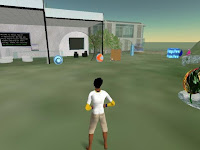
I also took a train ride whilst I was there - go and have a look if you don't believe me - it's an old steam engine, gives you a tour of the entire island and you can visit several well established university sites and other educational outlets including the Universities of Derby and Hull, and Learn Direct. Hop on and off where there is a station and explore...
Our SIM is shaping up to be a very useful 3-D virtual area to raise awareness of contraception, unwanted pregnancy, STDs and other issues that seriously affect the lives of young people. Our mix of open air auditorium and closed space information centre, including a teleport to a private sky-box consultation area, will hopefully make a positive contribution to sexual health. Oh, and the picture above is my own avatar seen visiting the site - he's called Loudli Singh, and he doesn't take up half as much space as I do...

I also took a train ride whilst I was there - go and have a look if you don't believe me - it's an old steam engine, gives you a tour of the entire island and you can visit several well established university sites and other educational outlets including the Universities of Derby and Hull, and Learn Direct. Hop on and off where there is a station and explore...
Our SIM is shaping up to be a very useful 3-D virtual area to raise awareness of contraception, unwanted pregnancy, STDs and other issues that seriously affect the lives of young people. Our mix of open air auditorium and closed space information centre, including a teleport to a private sky-box consultation area, will hopefully make a positive contribution to sexual health. Oh, and the picture above is my own avatar seen visiting the site - he's called Loudli Singh, and he doesn't take up half as much space as I do...
Labels:
avatar,
Education Island,
Maged Boulos,
Second Life,
sex
Monday, 23 July 2007
Getting the bloggers to write
We've been concerned for some time about the quality of essay writing here at the University of Plymouth. Last week my colleague Mark Townsend and I got together to talk, and we came up with the idea to combine blogs and wikis as an experiment to explore essay writing, and hopefully raise skill levels amongst our students. Here's the plan:
Mark and I are going to create a blogalogue (blog dialogue, get it?) about academic writing, including all the do's and don't's, common errors, and good things that we see in essays. Students will be invited to comment on our dialogue and ask questions, raise issues, or even tell us that we are completely barking. Whilst the dialogue is ongoing, Mark and I will actually create a live document within a wiki space, which students can also comment on, criticise and make recommendations about. On the wiki Mark will be writing in black text and I will be writing in blue and with the roll back facility, everyone will be able to track the progress of the paper as it evolves. (We may even publish it along with our commentary about the experiment). Using these two social tools, we hope to generate enough dialogue across the entire student groups to be useful for everyone who reads it.
If anyone has similar projects they are developing, or would like to try this idea out too, please send a comment to us. The blog, which we have called 'Black and Blue' is already up and running.
Mark and I are going to create a blogalogue (blog dialogue, get it?) about academic writing, including all the do's and don't's, common errors, and good things that we see in essays. Students will be invited to comment on our dialogue and ask questions, raise issues, or even tell us that we are completely barking. Whilst the dialogue is ongoing, Mark and I will actually create a live document within a wiki space, which students can also comment on, criticise and make recommendations about. On the wiki Mark will be writing in black text and I will be writing in blue and with the roll back facility, everyone will be able to track the progress of the paper as it evolves. (We may even publish it along with our commentary about the experiment). Using these two social tools, we hope to generate enough dialogue across the entire student groups to be useful for everyone who reads it.
If anyone has similar projects they are developing, or would like to try this idea out too, please send a comment to us. The blog, which we have called 'Black and Blue' is already up and running.
Labels:
academic writing,
blog,
blogalogue,
dialogue,
essays,
skills,
wiki
Friday, 20 July 2007
Second Life and sex
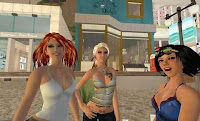 We are just over one week into our new project after being given a free land grant in Second Life. My co-investigators Maged Boulos (University of Plymouth, UK) and Susan Toth-Cohen (Thomas Jefferson University, USA) have been busy developing the Sexual Health Education site on Education Island. While I have been away in Greece they have made some impressive progress. So far the site consists of an open air arena (unlike here in England, there is no bad weather in SL unless you create it yourself), an information kiosk, a private counselling sky-box, an information obelisk and a variety of news board systems to inform visitors about upcoming events such as lectures and the like. There is also a Big Quiz game for all to try and maybe win a prize!
We are just over one week into our new project after being given a free land grant in Second Life. My co-investigators Maged Boulos (University of Plymouth, UK) and Susan Toth-Cohen (Thomas Jefferson University, USA) have been busy developing the Sexual Health Education site on Education Island. While I have been away in Greece they have made some impressive progress. So far the site consists of an open air arena (unlike here in England, there is no bad weather in SL unless you create it yourself), an information kiosk, a private counselling sky-box, an information obelisk and a variety of news board systems to inform visitors about upcoming events such as lectures and the like. There is also a Big Quiz game for all to try and maybe win a prize!We also have a new collaborator: ChaCha Biedermann has agreed to join our project and build a new interactive AIDS/HIV/STD information kiosk on our land. She has many exciting low-prim plans and ideas, including making the kiosk read content aloud using pre-recorded voice files. You can also find ChaCha’s Second Life group for supporting HIV-positives in-world, if you search for Groups and type in “AIDS”. Her group is named “AIDS and HIV HELP”.
You can check out all the latest news on the Sexual Health SIM blog, which is updated almost every day.
Labels:
AIDS,
HIV,
Second Life,
sex,
sexual health,
SIM,
sky box
Wednesday, 18 July 2007
Keen as mustard?
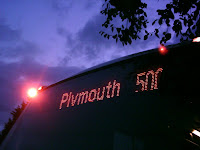 I'm back safely on British soil again, courtesy of British Airways, who always get you there in the end... I'm worried about National Express though. They seem to be incapable of joined-up-thinking. They got me from Gatwick to Heathrow OK, but then I sat waiting for an eternity at Heathrow central bus station for the 500 service to Plymouth. It was delayed by over two hours due to 'traffic congestion' in London. (So much for Ken Livingston's congestion charge, which makes craploads of money for the council, and no improvement in traffic flow). The bus behind it actually arrived first and there was pandemonium as both sets of passengers tried to board simultaneously. The driver had to fight them off with his clipboard, and he might even have used a rude word, but I can't be certain as someone's elbow was in my ear.
I'm back safely on British soil again, courtesy of British Airways, who always get you there in the end... I'm worried about National Express though. They seem to be incapable of joined-up-thinking. They got me from Gatwick to Heathrow OK, but then I sat waiting for an eternity at Heathrow central bus station for the 500 service to Plymouth. It was delayed by over two hours due to 'traffic congestion' in London. (So much for Ken Livingston's congestion charge, which makes craploads of money for the council, and no improvement in traffic flow). The bus behind it actually arrived first and there was pandemonium as both sets of passengers tried to board simultaneously. The driver had to fight them off with his clipboard, and he might even have used a rude word, but I can't be certain as someone's elbow was in my ear. Eventually, my bus set off amidst squally showers and very un-July weather. Such a constrast from the 37 degrees I left behind in Heraklion. What a summer - British weather is not good for the soul. We stopped for a 15 minute break at the Gordano service station just outside Bristol. Would you believe it... inside they were playing Cliff Richard singing 'O Little Town of Bethlehem!' No, I am not making it up - but I thought, how very appropriate, given the wintry torrents of rain outside.
I am in the middle of reading Andrew Keen's The Cult of the Amateur - in which he pours mustard all over Web 2.0, and suggests that it's a conspiracy to destroy our culture and assault our economy. Well I never... Keen seems more concerned about making sure that shareholders don't lose their money than he is about democracy, where everyone has equal access to the Internet as readers and writers. Keen is of course a share holder himself and a prominent capitalist. He's a few index points short of a dividend too if you ask me. He admits to trying to cash in on the Internet boom of the 90s, so how very appropriate for him to talk about bloggers behaving like monkeys with typewriters. It's the same as playing Christmas carols in the middle of summer... but not half as amusing. Check out Andrew Keen's own blog (well fancy that) and you'll see what I mean.
Labels:
Andrew Keen,
Cult of the Amateur,
Internet,
social software,
Web 2.0
Sunday, 15 July 2007
Cooking in Greece
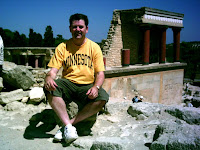 It's a sweltering 37 degrees plus here in Heraklion today, and it's Sunday, a day of rest. I have seen several bearded Greek Orthodox priests milling around in their black robes and pillbox hats, and wonder how they keep cool. The heat is bearable if you can find periodic shade, but we're all cooking here. I guess you could say that we are the Sunday roast... The conference closed yesterday and ended with a Greek night. The remaining ICICTE conference delegates (those whose heads weren't hammering a Cozy Powell solo) have just returned from a short trip out to visit the ruined palace of Knossos. It's a site that has seen earthquake after earthquake, but each time, the palace was rebuilt using the technology of the time. They simply built over what went previously. Then it fell to complete ruin and was buried and only excavated again around 1878. Now it's a visitors centre, and it's crawling with tourists.
It's a sweltering 37 degrees plus here in Heraklion today, and it's Sunday, a day of rest. I have seen several bearded Greek Orthodox priests milling around in their black robes and pillbox hats, and wonder how they keep cool. The heat is bearable if you can find periodic shade, but we're all cooking here. I guess you could say that we are the Sunday roast... The conference closed yesterday and ended with a Greek night. The remaining ICICTE conference delegates (those whose heads weren't hammering a Cozy Powell solo) have just returned from a short trip out to visit the ruined palace of Knossos. It's a site that has seen earthquake after earthquake, but each time, the palace was rebuilt using the technology of the time. They simply built over what went previously. Then it fell to complete ruin and was buried and only excavated again around 1878. Now it's a visitors centre, and it's crawling with tourists.It is so easy to focus on the ruins when you go to Knossos - that's what most people go there for. But I was reminded by a colleague that the palace was originally purposed so that people could look out and enjoy the stunning scenery that surrounds the site. So that's what I did - looked out. And it was beautiful. So often, when we repurpose new learning technologies and build them onto the old ones, we tend to look inwards at what they are and what they can do. Instead, we should be looking outwards, through them, so seeing how we can use new technologies to communicate with each other and share our ideas better. I'm flying out tomorrow, and will be glad to get back home, but it's been an interesting and rewarding experience here in Crete.
Labels:
Greece,
Greek Orthodox,
ICICTE,
Knossos,
learning technology,
repurpose
Friday, 13 July 2007
ICICTE 2007 Heraklion
Well, here I am sat in the foyer of the Atlantis Hotel, in Heraklion Crete, and at the end of the second day of the ICICTE Conference. It's been an interesting day with two stimulating workshops and several interesting papers. The first workshop was conducted by Henk Eijkman an Australian staff developer at the University of New England who spoke on the subject of Web 2.0. He got us running round the room doing many exercises and discussion around the idea of using Web 2.0 social software in the classroom. We all came away with several new ideas about how to use wikis, blogs and a host of other tools to enhance and extend the learning experience.
ICICTE kicked off yesterday with a keynote from Professor Rob Koper of the Dutch Open University, who inspired us with a report on TENCompetence - a European funded project that taps into the use of e-learning to create and maintain new competences for the workplace. More on this later, when I have had time to reflect on the enormity of what he is proposing....
Tonight several of us went out to sample the traditional Greek fayre (Souvlaki, Choriatiki, stay off the Raki), and the balmy climate of this region. Tomorrow I will be giving my own paper after lunch, entitled: 'Learning with 'e's: Defining e-Learning in a Knowledge Economy'. I hope to promote some healthy discussion on exactly what e-learning is, and the boundaries within which is can be defined. More on this also later... In the meantime, it's now 11.30 pm local time, so I'm off to bed. Kalinihxta!
ICICTE kicked off yesterday with a keynote from Professor Rob Koper of the Dutch Open University, who inspired us with a report on TENCompetence - a European funded project that taps into the use of e-learning to create and maintain new competences for the workplace. More on this later, when I have had time to reflect on the enormity of what he is proposing....
Tonight several of us went out to sample the traditional Greek fayre (Souvlaki, Choriatiki, stay off the Raki), and the balmy climate of this region. Tomorrow I will be giving my own paper after lunch, entitled: 'Learning with 'e's: Defining e-Learning in a Knowledge Economy'. I hope to promote some healthy discussion on exactly what e-learning is, and the boundaries within which is can be defined. More on this also later... In the meantime, it's now 11.30 pm local time, so I'm off to bed. Kalinihxta!
Greek Odd(ICT)y
I'm attending the first day of the 7th International Conference on Information and Communication Technologies in Education in Crete this week. The first day has gone well, with an excellent keynote speech from Professor Rob Koper (Open University of the Netherlands) and a series of short papers and workshops on e-Learning and computer mediated learning. Star billing must go to Dr Gorg Mallia (University of Malta) who gave us a dynamic paper entitled: 'A tolling bell for institutions?' in which he challenged us all to consider the ways in which we are currently teaching students. With the digital generation upon us, are our methods adequate? Are we providing relevant experiences and contexts, given that 'digital natives' speak with a different accent to 'digital immigrants'? This is of course a real (Mal)teaser of a question, and we all had a lot to say about it.
I spoke to Gorg for a long time afterwards and we discovered we have a lot in common. We are the same age, both artistic (he produces a regular satirical cartoon for his national newspaper) and we both have similar ideas about social software and its importance for the future of education. We have a lot more to talk about, so will be keeping in touch...
I spoke to Gorg for a long time afterwards and we discovered we have a lot in common. We are the same age, both artistic (he produces a regular satirical cartoon for his national newspaper) and we both have similar ideas about social software and its importance for the future of education. We have a lot more to talk about, so will be keeping in touch...
Tuesday, 10 July 2007
Second Life and us
 We're really excited! We have just been notified that we have been awarded a free land grant in Second Life to set up our own university health education centre. The grant runs until next July, and we have molto-Linden Dollars to spend on the installation.
We're really excited! We have just been notified that we have been awarded a free land grant in Second Life to set up our own university health education centre. The grant runs until next July, and we have molto-Linden Dollars to spend on the installation. You can read all about it on the blog the team has set up, and follow our progress over the next year as we investigate how we can use SL to provide 3D virtual learning opportunities. The programme we will be creating and delivering relates to sexual health, and my co-investigators are Maged Boulos (here in the Health and Social Work Faculty of the University of Plymouth) and Susan Toth-Cohen, who is based in Jefferson College of Health Professions, Thomas Jefferson University, USA. Hope you can join us - see you in Second Life!
Labels:
3D Virtual Learning,
blog,
Maged Boulos,
Second Life,
Susan Toth-Cohen
Monday, 9 July 2007
Imitation - the sincerest form of flatulence
Just come back from talking to StudentNet, an influential group which meets regularly here at the University of Plymouth to discuss issues surrounding student use of networked resources. I spoke about 'Social Software in Higher Education' and several really useful questions were raised by the group over copyright, validity and reliability of sources such as Wikipedia, plagiarism and 'fit for purpose' issues.
Landed on my desk I find the latest issue (No. 21) of the Centre for Bioscience Bulletin. On the back page is an interesting featured article entitled: 'The Wonderful World of Wikis', which says much the same thing as StudentNet. Bizarrely, the author Viv Rolfe, from De Montfort University, then goes on to talk about a wikipedia page dealing with the subject of flatulence.... students were asked to look at the page and assess how accurate it was, and whether they should change it or add to it. I assume the lecturer wanted the students' gut reactions....?
The author also mentions 'Wikiphobia' - a subject not yet covered on Wikipedia, ironically - and reveals that 67 % of students who plagiarised, also quoted from Wikipedia. Well, there's a thing....
'When you copy one person's work, it is plagiarism. When you copy many peoples' work, it is research....' (I copied this)
Landed on my desk I find the latest issue (No. 21) of the Centre for Bioscience Bulletin. On the back page is an interesting featured article entitled: 'The Wonderful World of Wikis', which says much the same thing as StudentNet. Bizarrely, the author Viv Rolfe, from De Montfort University, then goes on to talk about a wikipedia page dealing with the subject of flatulence.... students were asked to look at the page and assess how accurate it was, and whether they should change it or add to it. I assume the lecturer wanted the students' gut reactions....?
The author also mentions 'Wikiphobia' - a subject not yet covered on Wikipedia, ironically - and reveals that 67 % of students who plagiarised, also quoted from Wikipedia. Well, there's a thing....
'When you copy one person's work, it is plagiarism. When you copy many peoples' work, it is research....' (I copied this)
Labels:
plagiarism,
wiki,
wikipedia,
wikiphobia
Thursday, 5 July 2007
Greece is the word
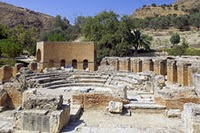 Kalamera! I'm off on my travels once again next week, back to the Mediterranean again - to the beautiful Greek island of Crete. I'm speaking at the International Conference on Information Communication Technologies in Education (ICICTE) Conference and I'm looking forward to hooking up again with old friends and also meeting some new colleagues. My paper is entitled 'Learning with 'e's: Defining technology supported e-learning within a knowledge economy', and I hope to generate some debate about the evolving nature of e-learning.
Kalamera! I'm off on my travels once again next week, back to the Mediterranean again - to the beautiful Greek island of Crete. I'm speaking at the International Conference on Information Communication Technologies in Education (ICICTE) Conference and I'm looking forward to hooking up again with old friends and also meeting some new colleagues. My paper is entitled 'Learning with 'e's: Defining technology supported e-learning within a knowledge economy', and I hope to generate some debate about the evolving nature of e-learning.The keynote speaker is Rob Koper from the Open University of the Netherlands. He is the director of learning technologies, and leads a team of 40 researchers. The Open University is based in Heerlen and Maastricht, down in the extreme south of Holland, and it's an old stomping ground for me... I went to school there between 1971-73.
We will be staying at the Atlantis Hotel in Heraklion, and the conference will be located in the hotel, which means no long distance travel to get to the venue, like we had to in Napoli.... Forecast for next week is blue sky (thinking) and temperatures up to 33 degrees. I will blog about the conference when I can, if I don't get thermal shock.
Labels:
Heraklion,
ICICTE,
ICT,
Maastricht
Wednesday, 4 July 2007
Calling an ALT to it
Such a relief... it's 01.30 in the morning and I have just finished writing the editorial of the Research Proceedings for ALT-C 2007 - the Association for Learning Technologies annual conference. I've been working closely with Nicola Whitton (Manchester Metropolitan University) who is my co-editor, to complete this in time for it to go to press in time for the conference. We have 18 very interesting and thought provoking papers this year, and putting it all together has been time consuming but very rewarding. It's no co-incidence that today is Independence DAY! Yeehaw!
ALT-C is the premier UK e-learning event and promises to be yet another success this September. This year we meet in Nottingham, at the East Midlands Conference Centre, and as of yesterday, over 380 delegates had already registered for the event. Keynote speakers include an old friend of mine, Michelle Selinger from Cisco, and Peter Norvig, who is the head of research at Google. There's still time for you to book your place, but be quick... Spaces are filling up fast - see you at ALT-C in September!
ALT-C is the premier UK e-learning event and promises to be yet another success this September. This year we meet in Nottingham, at the East Midlands Conference Centre, and as of yesterday, over 380 delegates had already registered for the event. Keynote speakers include an old friend of mine, Michelle Selinger from Cisco, and Peter Norvig, who is the head of research at Google. There's still time for you to book your place, but be quick... Spaces are filling up fast - see you at ALT-C in September!
Labels:
ALT-C,
Cisco,
e-learning,
Michelle Selinger,
Nicola Whitton,
Peter Norvig
Tuesday, 3 July 2007
Widgit and they will come...
I'm sat here in a computer suite at the University of Plymouth with a bunch of my colleagues, all trying to get our heads around the new MicroSoft SharePoint software which will be unleashed upon our unsuspecting students in the Autumn term. Cry havoc, and let slip the dogs of war! Sighs, head scratching, bemused faces, more sighing, an 'arghh' and an occasional 'hooray', as something actually works for someone. We are investing a lot of time and effort into this, and the facilitators are sweating cobs, so I sincerely hope it gets used.
The bottom line is this - people will use a new technology or piece of software providing they see a clear benefit for it. We need to consider the affordances and constraints. We need to ask ourselves the question - what can I do with this *widget* that I couldn't do before? If the answer is 'nothing', then ditch the *widget* and get on with yer life. On the other hand, if there are new things you can do with the *widget*, then learn all you can about it, and use it to enhance learning. It's not just a case of 'build it and they will come', but more about 'how can I build it to make it welcoming?'
Is SharePoint another weapon of mass distraction? Or is it going to turn out to be a boon? Here's the secret.....Make a technology transparent and students will concentrate more on learning new things than they will on the technology.
The bottom line is this - people will use a new technology or piece of software providing they see a clear benefit for it. We need to consider the affordances and constraints. We need to ask ourselves the question - what can I do with this *widget* that I couldn't do before? If the answer is 'nothing', then ditch the *widget* and get on with yer life. On the other hand, if there are new things you can do with the *widget*, then learn all you can about it, and use it to enhance learning. It's not just a case of 'build it and they will come', but more about 'how can I build it to make it welcoming?'
Is SharePoint another weapon of mass distraction? Or is it going to turn out to be a boon? Here's the secret.....Make a technology transparent and students will concentrate more on learning new things than they will on the technology.
Labels:
affordances,
constraints,
SharePoint
Subscribe to:
Posts (Atom)
Featured sites
- Best Non Gamstop Casinos 2025
- UK Casinos Not On Gamstop
- Non Gamstop Casino
- Casinos Not On Gamstop
- Non Gamstop Casino
- UK Gambling Sites Not On Gamstop
- Casino Sites Not On Gamstop
- UK Casino Not On Gamstop
- Non Gamstop Casino UK
- Sites Not On Gamstop
- Non Gamstop Casino
- UK Casino Not On Gamstop
- Casinos Not Signed Up To Gamstop
- Non Gamstop Casino Sites UK
- Non Gamstop Casinos UK
- Non Gamstop Casinos
- Casinos Not On Gamstop
- UK Casino Not On Gamstop
- New Non Gamstop Casinos Uk
- List Of UK Casino Sites
- Top UK Casino Sites
- Online Betting Sites Not On Gamstop
- Non Gamstop Casino Sites UK
- Non Gamstop Casino Sites UK
